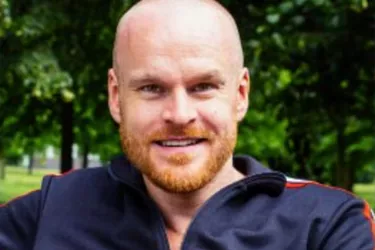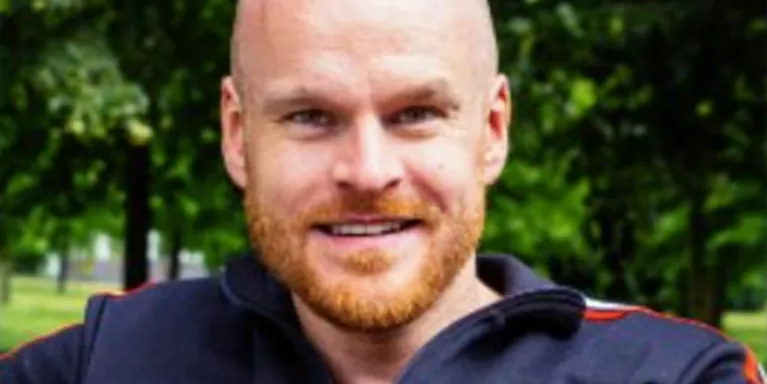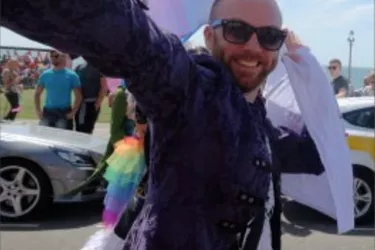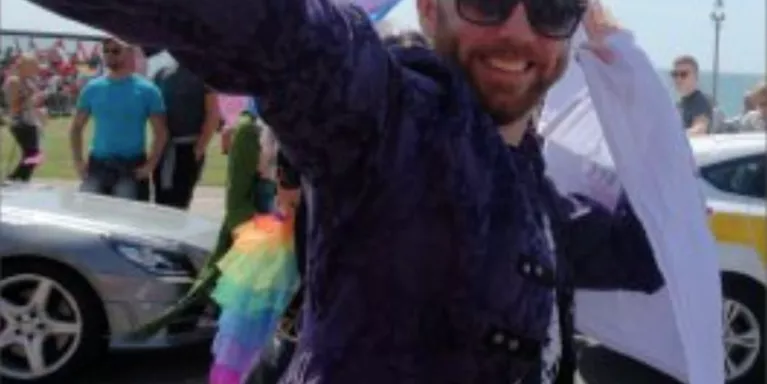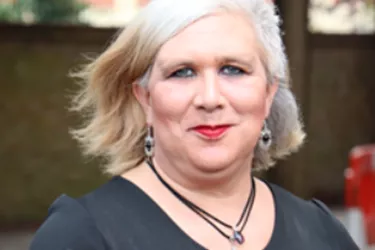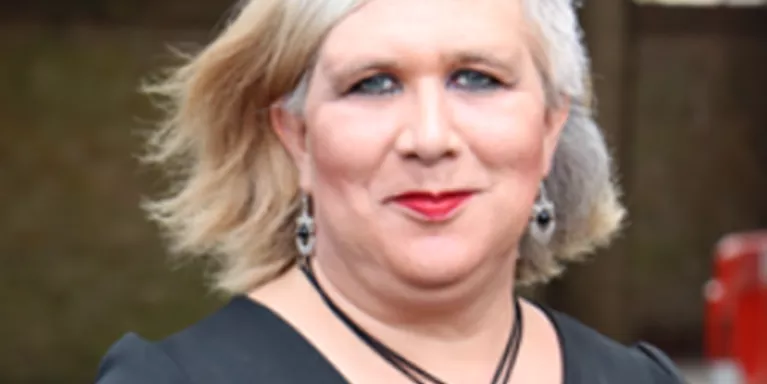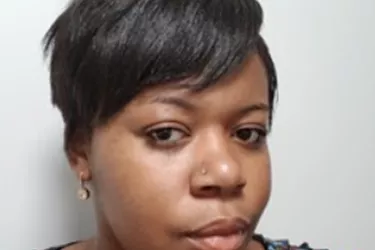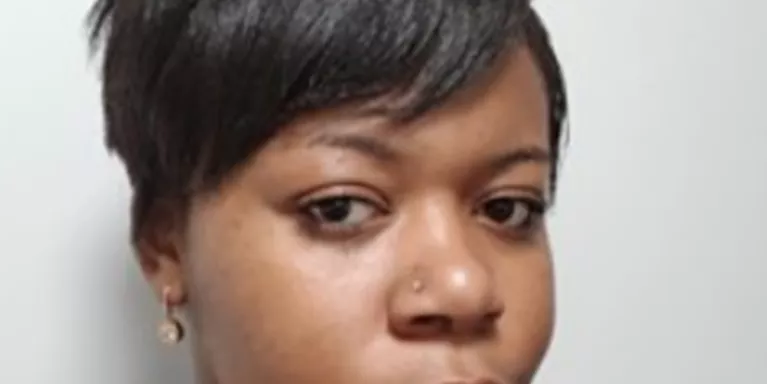Why I'm going to Pride with Mind
Ed and others from our LGBTIQ+ staff network will be taking Mind to Pride today along with staff from our local Minds and charity shops. Ed shares his personal experience of being a queer trans person, the impact on his mental health and why being at Pride is so important to him and LGBTIQ+ mental health.
Edward lives in London with a stripey ginger cat. He can usually be found cycling through the woods.
This year for the first time, Mind is taking part in Pride in London, the annual celebration of lesbian, gay, bi, trans and queer people. Pride means different things to different people, and while I support the cause, as a person who experiences a lot of anxiety, I haven't always felt able to take part.
The mental health problems I've had over the years closely intertwine with my identity as a queer trans person. Growing up I didn't have the words to make sense of the messy, confusing experiences I was having. Without a language to describe myself, I didn't know myself, and I couldn't communicate who I was to anyone else. Without knowing why, I was always uncomfortable in my own skin and lived with an unrelenting anxiety.
"Without knowing why, I was always uncomfortable in my own skin and lived with an unrelenting anxiety."
I tried all sorts of different ways to get away from my body. I tried pretending to be someone else, starving myself, binge eating, and eventually just dropping out of my life and isolating myself away from everything. I repeatedly tried mental health services but I didn't know what was wrong. They'd ask, What makes you anxious? And I'd say, everything does.
When I did come out as trans it didn’t give me an immediate boost to my mental health. Recognising myself as a trans person and working my way through the long path of transitioning to male was hugely stressful. I was met with confusion and dismissal, and told “no, I don't think you are trans, that's not a real thing.” As well as telling my parents and friends, I had to awkwardly tell a lot of strangers, everyone from the benefits office to the man who came to fit new floorboards, that I now go by “Mr” even though I didn't look at all male. It is an incredibly vulnerable time, to be so exposed, unsure of what you need to do. People looked to me to explain what was going to happen, but I didn’t know, I was figuring it out as I went. Often I doubted if I was doing the right thing, there was so little information available.
But at the same time it was a huge relief to be able to finally put something as omnipresent but intangible as gender dysphoria into words. And with words for it, I found a community of people for the first time who felt like me. It has been lifesaving to be able to know who I am and be seen that way in the world. I was only able to get here because of the people before me who spoke up in public, who appeared on tv, who published memoirs, who started internet forums. It is a cliché, but it is still true: we cannot be what we cannot see. And events like Pride have a role to play in this.
"It is a cliché, but it is still true: we cannot be what we cannot see. And events like Pride have a role to play in this."
The first Pride I went to was Brighton Pride in 2010. I walked down the hill to Preston Park planning to catch the end of the parade and walk around the different stages. But I never made it into the park. I stayed half an hour, and then went home. For me, with all the anxiety I deal with, it was overwhelming. The crowds. The noise. The dizzying mass of colours and lights and flags. I didn’t know anyone else at that time who was there, whereas everyone else seemed to know everybody. I didn’t like the dance music, I didn’t want to get drunk at two in the afternoon. It was depressing to find that there was nothing there for me to take part in. I doubted myself again: maybe I wasn’t queer enough? Maybe I should be more full of pride?
Over the next few years I got more involved in the queer scene in Brighton and found people who, like me, wanted to take part in Pride but were put off by the atmosphere. We worked with Brighton Pride to make the park more inclusive for trans people, organised groups to march together in the parade and support each other if they found crowds and noise difficult, and helped create a quiet space in the park.
But it can be easy to miss that Pride is still a protest. The LGBTQIA+ pride movement was born in the late sixties, fighting back against the frequent police raids on New York gay clubs. For me, today’s Pride is a chance to celebrate what has been achieved since then, but highlight that the work isn’t done.
For me, today’s Pride is a chance to celebrate what has been achieved since then, but highlight that the work isn’t done.
Pride is a reminder to everyone that LGBTQIA+ people still face daily discrimination. And it is a reminder to ourselves, that not everyone in our community has the same rights and privileges and we need to support each other.
Mind's Pride entry this year was organised by the LGBTQIA+ Staff Network and we’ll be joined by people from our local Minds and Mind shops across London. I am so pleased this is finally happening. The need to stand up and show commitment to LGBTQIA+ people is needed now as much as ever. LGBTQIA+ mental health is in crisis. There is now stacks of research that shows LGBTQIA+ people experience greater levels of mental health problems, so it is the responsibility of every mental health organisation to work on making themselves inclusive for their staff and their service users.
"There is now stacks of research that shows LGBTQ people experience greater levels of mental health problems, so it is the responsibility of every mental health organisation to work on making themselves inclusive for their staff and their service users."
And the LGBTQIA+ community needs allies like Mind to show a commitment to LGBTQIA+ people. It is not enough to assume that all the work can be done by queer people alone.
For the staff it is a day to come together and forge connections across our different teams, many of us having never met before, and find strength and bonds. For Mind it is the chance to say we can and will do more for the LGBTQIA+ community.
Go to more info about our work with LGBTQIA+ communities.
Go to more information about mental health support for those of us who are lesbian, gay, bisexual, trans, intersex, queer or questioning (LGBTQIA+).


Information and support
When you’re living with a mental health problem, or supporting someone who is, having access to the right information - about a condition, treatment options, or practical issues - is vital. Visit our information pages to find out more.
Share your story with others
Blogs and stories can show that people with mental health problems are cared about, understood and listened to. We can use it to challenge the status quo and change attitudes.










